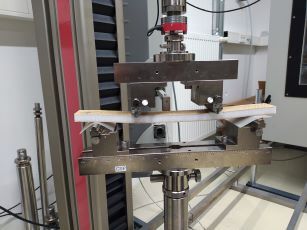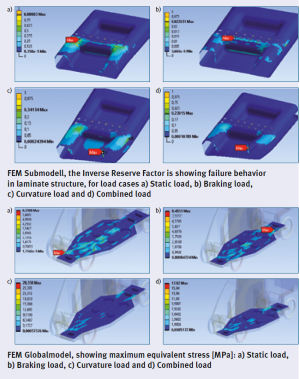Light Electric Vehicles (LEV) differ fundamentally from established vehicle concepts - not only in terms of the consumption of operating energy and resources, but also in terms of production, use and recyclability. Based on a roadworthy prototype vehicle of registration class EU L7e, the "LEVmodular" project examines alternative vehicle concepts for their potential contribution to a circular economy.

Sustainability in production and versatility
Light electric vehicles offer the opportunity to rethink vehicles - from the use of innovative materials and decentralized production in relatively small batch sizes to new mobility concepts. Using this example, the project partners are investigating the conditions under which the vehicle supply industry can contribute to a new mobility.
The project consortium contributes to the challenges that not only densely populated cities are facing in the face of increasing traffic density - whether it be parcel delivery over the last mile, ecological passenger transport in all weathers or equipment carriers for municipal services. In order to support the turnaround in traffic, vehicle concepts are needed that support a circular economy both from the point of view of life cycle assessment and in terms of their possible applications.
By aiming to derive further vehicle variants on the basis of the "Cargo Cruiser II", the project partners are answering questions on the recycling-economic feasibility of LEV. On the other hand, expected barriers to acceptance compared to alternative vehicle concepts will be minimised by a Real-World Laboratory approach.

Light vehicles from the middle class
In view of the already highly developed efficiency in conventional vehicle construction, the approaches pursued should provide alternative contributions to the vehicle market. With the consistent further development of a muscle-powered electric light vehicle, the project participants want to pave the way for a value creation in production and use in line with the circular economy.
Two construction methods are being examined for their potential for circular economy feasibility by varying aspects such as material classes, production technologies and location strategies. For this purpose, instruments of component design and optimization (Finite Element Method) and Life Cycle Assessment (LCA) are used.
For the economic investigation of the application areas of novel materials and semi-finished products suitable for recycling management, an existing LCA database is supplemented by as yet unknown production processes. For this purpose, the real-laboratory approach is used to interact with partners in the vehicle construction industry as well as with potential users and owners of light vehicles. Industrial design methods are used to achieve high user acceptance. Materials and semi-finished products that appear promising for use within a recycling economy are then examined comparatively at the design level in two methods of construction.
Results (Status June 2022)
Real Life testing the Cargo Cruiser II in City of Berlin gave new inputs for the construction in fibre composite of Cargo Cruiser III. The material-behaviour in composite construction was investigated by evaluation of different failure criteria using a Finite Element Modell in global- and submodel scale. The load cases therefore where defined for 45 km/h and a load capacity of 300 kg.
The fibre composite structure actual is under construction and test drives with CC III are planned in City of Dessau. A design solution was found for the easily manageable conversion between the "cargo" and "passenger transport" modes of use, for which a patent application has been filed.
Parallel to construction of CC III the needed data for Life Cycle Inventory and analysis of Environmental Impact Assessment focusing CO2 equivalent was collected. First findings from LCA showing the relevance of energy mixes – in production and in use phase of Light Electric Vehicles. From Insights by doing LCA a new approach for end of life use of natural fibre composites is brought in to discussion. To realise a mechanical monitoring of the fibre composite (Structural Health Monitoring) a setup of sensor and Long Range Wireless Access Network (LoRaWAN) compatible measurement device was identified and tested.
Innovative spirit and efficiency
Based on the "Cargo Cruiser II" prototype, vehicle variants for different urban usage scenarios are derived and transferred into a modular vehicle design. Prototypical vehicle variants are used to gain empirical findings on aspects such as usability of the vehicle variants, ergonomics of the muscle-powered electric drive and user acceptance. By holistic consideration of the Life Cycle Assessment, statements on the recyclability of the considered construction methods are expected.
Based on solid experience in lightweight vehicle construction, the company Olaf Lange, Berlin, in close cooperation with FVK GmbH, Dessau-Roßlau, contributes significantly to the approval-compliant design of the vehicle construction. FVK GmbH focuses on manufacturing, maintenance and conversion of the vehicle modules in accordance with recycling management requirements. The Fraunhofer IMWS in Halle (Saale) is responsible for the material optimisation and investigation of the suitability for recycling as well as the coordination of the entire project.
Publications
Wüstenhagen, S. and Kirschstein, T.: Substitution of Conventional Vehicles in Municipal Mobility", sustainability 2024
Wüstenhagen,S., Lange, O., Franze., A.: Leicht und robust unterwegs, UmweltMagazin (2023), S. 19-21: https://www.ingenieur.de/wp-content/uploads/2023/09/UmweltMagazin_9-10_2023_UMW-9-10-2023.pdf
S. Wüstenhagen, P. Beckert, O. Lange, A. Franze. Light Electric Vehicles for Muscle–Battery Electric Mobility in Circular Economy: A Comprehensive Study. Sustainability 2021, 13, 13793–13804. https://doi.org/10.3390/su132413793
Project flyer of the funding measure (German / English) (March 2021)
The project flyers offer an insight into the contents and goals of the ReziProK projects and present first results in each case.
Project sheets of the funding measure (German) (August 2019)
The project sheets provide a brief overview of the individual projects and their goals.
Contributions to the ReziProK Transfer Conference in June 2022
Poster (German) (June 2022)
Presentation (German) (June 2022)
Contributions to the ReziProK Kick-off event in December 2019
Poster - in German (December 2019)
Presentation - in German (December 2019)
Picture credits: © Fraunhofer IMWS
